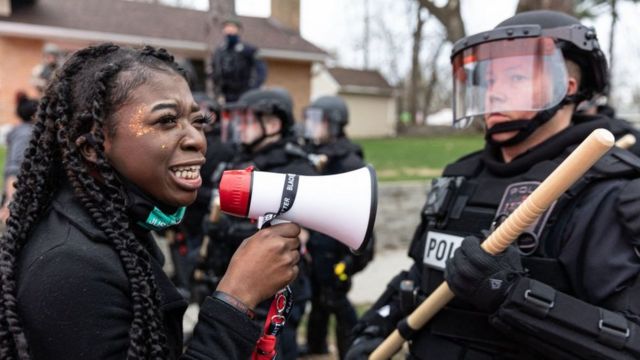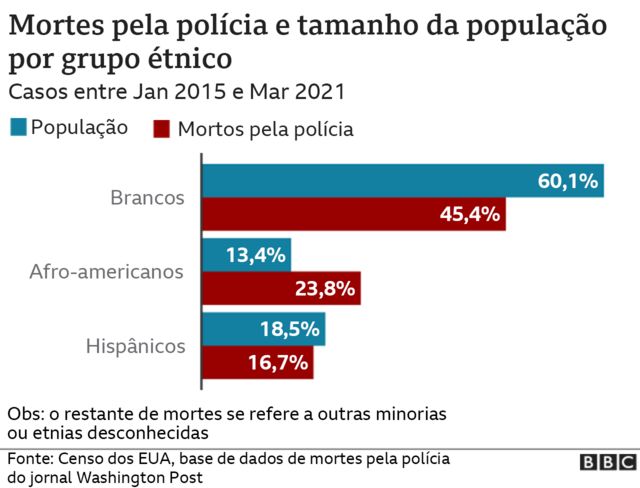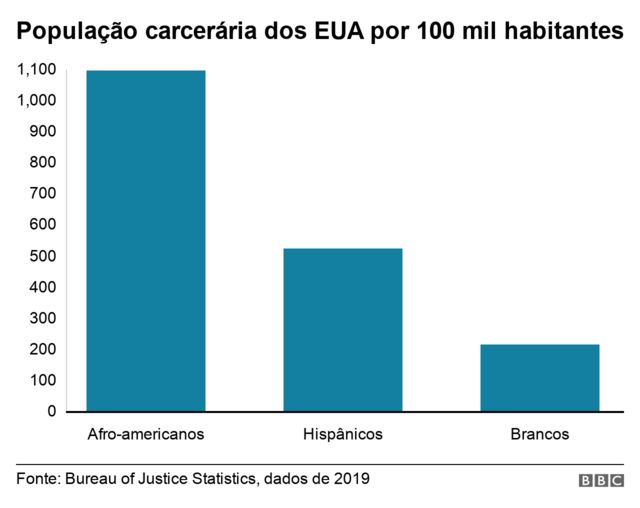Four facts that help explain tension between black Americans and the police
There were protests in Minneapolis during the Derek Chauvin trial
Amid the trial of the former police officer accused of killing George Floyd, data show that when it comes to law and order, African Americans continue to receive more violent treatment than whites.
Floyd, 46, was strangled by a white police officer, Derek Chauvin, who knelt on his neck during an approach in Minneapolis, Minnesota, in March last year.
His death sparked protests around the world against police violence and discrimination against blacks.
This week, another case, also in Minneapolis, drew attention because of the similarity with the episode that resulted in Floyd's death.
Daunte Wright, 20, was shot and killed by a police officer during a traffic violation approach.
Death also sparked protests. About 40 people were arrested north of the city on a second night of demonstrations.
In Brazil, eight out of ten people killed by the police in 2019 were black according to the Brazilian Public Security Yearbook 2020.
The BBC analyzed data on crime in the United States and found that:
1. African Americans are more likely to be killed by the police
Available data on incidents in which the police shoot and kill people show that, for African Americans, there is a much greater chance of being killed compared to the total population of the United States.
According to the police death database of the American newspaper The Washington Post, although African Americans make up less than 14% of the population, they have been nearly 24% victims of the more than 6,000 deaths caused by the police since 2015.
The total number of deaths by the police has remained relatively stable - around 1,000 a year since 2015.
Subsequent surveys show that the death rate of unarmed blacks by police in the United States is three times higher than that of whites.
2. African Americans are more likely to be stopped by the police
Studies show that blacks are more likely to have their car stopped by the police.
One of the most recent, a 2020 study from Stanford University, looked at 100 million approaches to traffic by police departments in the United States and found that black drivers were about 20% more likely to be stopped than white drivers.
The study also found that, once stopped, black drivers were searched up to twice as often as whites, although they were statistically less likely to transport illegal items.
3. African Americans are arrested at higher rates for drug abuse
African Americans are arrested for drug abuse at a much higher rate than white Americans, although research shows that narcotics are used at similar levels.
In 2018, about 750 out of every 100,000 African Americans were arrested for drug abuse, compared with about 350 out of every 100,000 white Americans.
Previous nationwide drug research shows that whites use drugs at similar rates, but African Americans continue to be arrested more often.
For example, a study by the NGO American Union for Civil Liberties found that African-Americans were 3.7 times more likely to be arrested for marijuana possession than whites, although drug use was similar.
4. More African Americans are in prison
African Americans are imprisoned at a rate five times higher than that of white Americans and twice that of Hispanic Americans, according to the latest data.
In 2019, African-Americans were about 13% of the U.S. population, but represented almost a third of the country's prison population.
White Americans, on the other hand, were about 30% of the prison population, despite representing more than 60% of the total population of the United States.
That means more than 1,000 African-American prisoners for every 100,000 African-American residents, compared to about 200 white inmates for every 100,000 white Americans.
The prison population of the United States is defined as inmates sentenced to more than one year in a federal or state prison.
Incarceration rates have fallen for African Americans in the past decade, but they have outpaced any other race in terms of the prison population, proportionately.




No comments:
Post a Comment